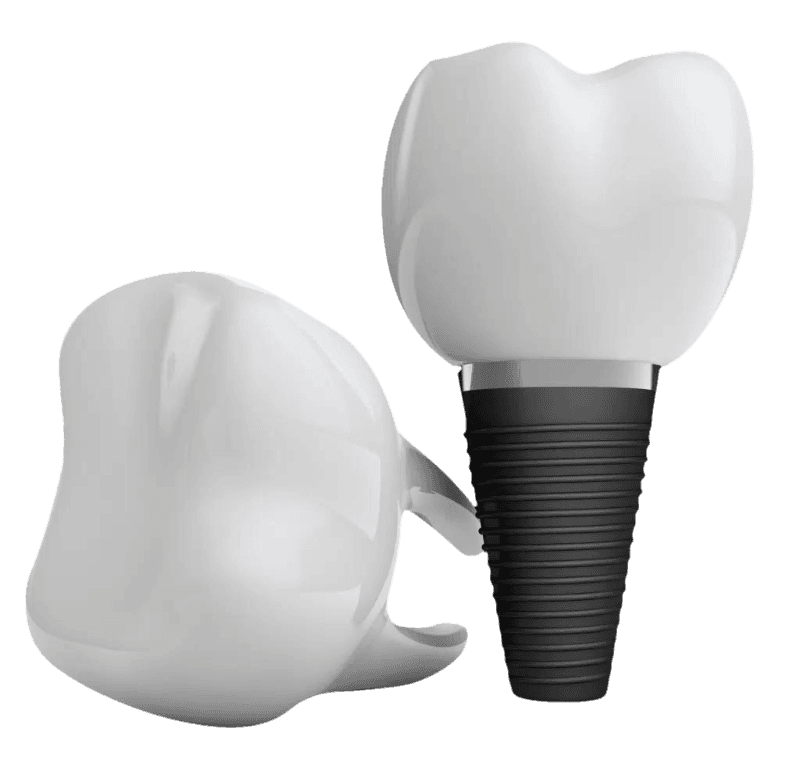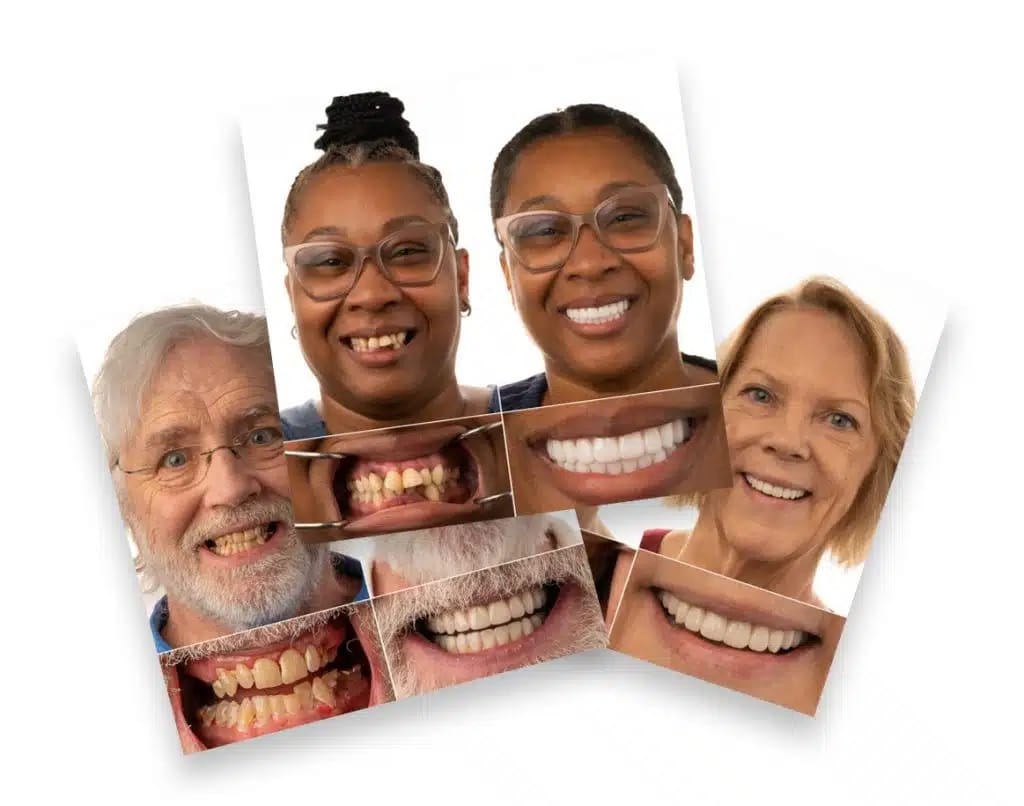FAQs
Why JAX Implant Center
Our #1 goal is to provide top of the line treatment at an affordable price. How do we achieve this?:
While most dental offices provide root canals, fillings, crowns, braces, etc, we focus exclusively on dental implants, extractions, and dentures.
Having an in-house lab allows us complete control of your final teeth while also reducing cost and delays that normal offices experience.
Dr. Russell and Dr. McRee attended the same residency focused exclusively on dental implant surgery and restorations. This extra training has given them the skills and techniques to perform these procedures thousands of times with great success.
We utilize ground breaking technology in the form of 3D scanners, CAD/CAM milling, 3D printers, and more that provide the most accurate restorations that are then hand finished by our highly trained technicians to give your teeth that lifelike appearance that everyone desires.


Why You Should Choose JAX Implant Center
| JAX Implant Center |
|---|
| |
| |
| |
| |
| |

What is a dental implant?
Dental implants are small titanium posts that replace the roots of missing teeth. They are inserted into your jawbone and are made from a surgical grade inert material. Inert means you won't be setting off any alarms at the airport. After the implant has been placed, a natural lifelike porcelain tooth crown is attached. In some cases, the implant needs to fuse with the bone for several months before it is permanently crowned; in other cases, you can have new (temporary) teeth the same day your implants are placed. The treatment time varies based on bone quality and quantity. The best thing about an implant is it's the next best thing to your natural tooth! Floss it and brush it just like your own. It not only looks and functions like a natural tooth, but it helps support the bone in your jaw. Just like weight bearing exercise promotes healthy bones; teeth in function help promote healthy jawbone.
Dental implants are not always the least expensive options, but they are usually the best long term option. Implants offer so many benefits and their long term success is over 97%. Our all inclusive pricing without insurance is $2799 per implant. This includes the implant, abutment, and crown. This is for a single implant and crown, but we have other all inclusive packages to replace multiple or all teeth.
Click Here for more pricing option.
Dental implants can be utilized to replace one tooth or an entire arch of teeth. If you are missing a few teeth, we can often place implants in order to support permanent bridges to save on treatment cost. If you are missing all of your teeth, we can strategically place implants to replace your entire arch with permanent teeth in as little as 24 hours!

Most people find dental implant surgery very easy to tolerate with minimal soreness for a few days afterwards. Any post-operative discomfort can usually be managed with over-the-counter (OTC) anti-inflammatory medication such as ibuprofen or OTC pain-relievers. If you have had a tooth extracted before, implant placement is usually easier and less painful than the extraction.
There’s a good chance that you are, but this can only be determined after a complete oral examination that includes x-rays of your jaw to evaluate the quality and quantity of bone. We offer a complimentary implant consultation including necessary images to determine if you are a candidate. Please schedule a consultation to begin the exciting process of restoring your smile and bite.
FAQ - Single Tooth Implants
It depends. Since every case is unique, we’ll need to see you for a consultation to figure out the best course of treatment for you.
Absolutely. We are one of the few centers in America who provide this service. We routinely offer this service for anterior (front) teeth so that you can live your life without the need to hide your smile during healing. This service is not offered on posterior (back) teeth and cannot always be provided in every case.
WARNING: DURING HEALING EATING ON THE TEMPORARY TOOTH IS PROHIBITED AND CAN VOID THE WARRANTY IF IT CAUSES IMPLANT FAILURE. PATIENTS WHO CHOOSE THIS OPTION MUST SIGN A WAIVER AGREEING TO ALLOW THE HEALING PROCESS TO OCCUR WITHOUT PUTTING PRESSURE ON THE IMPLANT.
Almost everyone is a candidate for dental implants, even those who have been told they weren’t in the past. Our doctors focus solely in implant surgery and have handled the most challenging of cases. Call us to schedule your consultation with our doctors and discuss your options.
Care for them like natural teeth. The goal of implants is to not be able to tell it apart from your natural teeth. Brush and floss as normal and continue regular care as indicated by your dentist.
In the mouth, they look almost identical to a natural tooth. The implant body (the screw) won’t be visible in the mouth. It is placed under the gums in your bone.
Yes! Some may notice a slightly different feel than from a natural tooth, but it will function the same.
Most patients are able to return to work either the same day or the next day. More extensive cases could require more time off from work.
You may continue to bleed slightly for the first 24 hours after your implant placement. If you feel that you are bleeding more than you should be, please call the clinic.
An old home remedy that works really well to help clotting and stop bleeding is the use of tea bags. Just get a regular black tea bag, dampen it with cool water, squeeze out the excess water, place it on your extraction site or sites, and the bag will help you clot. Multiple tea bags can be used, if needed. Replace the tea bags and repeat the process as many times as you need.
We offer many levels of sedation ranging from nitrous (laughing gas) to full IV sedation. For nitrous, you will not need a driver. It can be administered in office with immediate recovery. Oral sedation (a sedative pill) is given in the office and allows a significant reduction in anxiety. Many of our patients do not remember the procedure at all. IV sedation is administered at our office and allows for the greatest level of sedation and comfort. NOTE: You MUST have a driver after you have taken your oral sedation pill(s) or IV sedation. You MUST NOT operate a motor vehicle or any machinery after taking your medication.
While experiences will vary, there could be some discomfort and possibly swelling after your procedure. Many patients report very little discomfort after their procedure. You will be prescribed pain medication to help alleviate any discomfort.
The process is very simple. Your implant is placed into your jawbone and is left alone to integrate for 4-6 months. After this, we take impressions and have your tooth fabricated to fit the spot. If you do not have enough bone and require a bone graft, this can increase treatment time.
No, once your implant is completed, you will not be able to remove it.
We do not currently offer this type of implant. While titanium implants have been around for decades with a long track record of success, zirconia implants are very new to the market, so we do not know what their success will be like long-term. We want the most successful, most predictable, best long-term results for our patients, and for these reasons, we do not offer zirconia implants at this time.
While titanium dental implants do have a 95+% success rate, yes, they can still fail. Some of the things that can cause them to fail:
⦁ failure to integrate into the bone
⦁ smoking
⦁ diabetes
If an implant fails within the first year, your dentist will replace it at no charge to you.
FAQ - Implant Dentures
- Upper —An upper implant denture requires at least 4 implants.
- Lower —A lower implant denture requires at least 2 implants, although 3 or 4 typically provide a significant improvement in retention and stability.
- We highly recommend 4 for optimal function. We have found that patients prefer the increased stability and function, giving them greater overall satisfaction, confidence, and happiness in their everyday life.
If a patient has fears of the surgery and procedure, we provide multiple sedation services ranging up to full IV sedation for patients with anxiety. We also provide a calm and restful environment in our new, state-of-the-art clinic. Meeting with our experienced clinicians will allow us to answer any questions you may have, and we feel confident that our staff will be able to put your fears at ease.
Yes. We provide many different services to allow our patients to more easily breakdown the costs into monthly installments. We understand these procedures can be life-changing and we believe in providing them at a reasonable cost. Implants are an investment in yourself and should be available to anyone, at any budget.
No! We only place standard, full size dental implants at our clinic. These have a much higher success rate and will last much longer than mini implants.
Please proceed with caution at any office recommending mini-dental implants as a permanent solution. They have a very high failure/complication rate.
We have our prices listed for everyone to easily understand and know what they are getting. To see all our prices please click here.
In many cases, yes! We’ll just need to see you for a free consultation, during which we will do a 3D CBCT scan of your jaw to see if you have enough bone for dental implants. Our doctors have done 1000s of implants and are very skilled at providing stable, long term implants even in cases with limited bone.
No, we must allow time for your implants to integrate with your bone. This is what makes your implants truly stable and will help ensure you enjoy many years of use from them. We typically wait between 4 and 6 months before attaching your denture to your implants.
While experiences will vary, you should expect some discomfort and possibly swelling after your procedure. Many patients come in the next day for their post op appointment reporting very little discomfort. You will be prescribed pain medication to help alleviate any discomfort.
We offer many levels of sedation ranging from nitrous (laughing gas) to full IV sedation. For nitrous, you will not need a driver. It can be administered in office with immediate recovery. Oral sedation (a sedative pill) is given in the office and allows a significant reduction in anxiety. Many of our patients do not remember the procedure at all. IV sedation is administered at our office and allows for the greatest level of sedation and comfort. NOTE: You MUST have a driver after you have taken your oral sedation pill(s) or IV sedation. You MUST NOT operate a motor vehicle or any machinery after taking your medication
Yes! They are much more secure than dentures alone, and we are able to increase the retention with stronger inserts if you prefer.
Most patients with 4 implants in the upper arch are able to have a large portion of the palate (roof of the mouth) removed from their denture. This increases the ability to taste for many patients, and also increases hot and cold sensitivity, making for a more natural experience. For those patients with a severe gag reflex, getting an implant denture without the palate can provide relief.
Implant inserts are nylon rings that insert into your snap-in denture. Over time, the nylon can wear out. Most patients get these replaced once or twice a year. This will depend on how many implants you have, how strong your bite is, how frequently you take your dentures in and out, and several other factors.
WARNING: PLEASE DO NOT BITE DOWN ON YOUR DENTURES TO SNAP THEM INTO PLACE ON YOUR IMPLANTS! This will wear out your inserts significantly faster. Only place your implant dentures in by hand.
Alveoplasty is a procedure where the doctor contours your jawbone. This procedure is important because it can significantly improve the fit and comfort of your dentures.
Tori are bony knots that naturally develop in the mouth of some people. They are not harmful, however, they can prevent your denture(s) from fitting comfortably, so your doctor will often recommend having them removed.
This is completely normal when you first have a prosthesis (denture) placed in your mouth. Your body senses it as a foreign object and is trying to “flush” it out. This increased salivation should subside within 2-3 days.
Significant bleeding will have stopped before you leave the clinic, however, expect to have some slight bleeding (oozing) for 1-3 days after the procedure. Additionally, you will most likely notice increased salivation when we first put your temporary denture(s) in. When this increased saliva mixes with a slight bleeding, it can look like a lot of blood. If heavy bleeding continues, please call the office.
An old home remedy that works really well to help clotting and stop bleeding is the use of tea bags. Just get a regular black tea bag, dampen it with cool water, squeeze out the excess water, place it on your extraction site or sites, and the bag will help you clot. Multiple tea bags can be used, if needed. Replace the tea bags and repeat the process as many times as you need.
We do not currently offer this type of implant. While titanium implants have been around for decades with a long track record of success, zirconia implants are very new to the market, so we do not know what their success will be like long-term. We want the most successful, most predictable long-term results for our patients, and for these reasons, we do not offer zirconia implants at this time.
Yes, any prosthetic in the mouth may get a small amount of food under it. The great thing about implant dentures is how easy they are to clean. Just take them out; clean the denture(s), your gums, and implants; and snap them back in.
Every patient is different. Some return to work the next day, others wait a week or two. This also depends on your type of work. Some factors to consider when taking off work are:
- The chance of bruising and swelling in the days immediately after surgery
- The time you’ll want to allow you to get used to eating and speaking with your new teeth
Soft liners are cushions that we place in your denture periodically while you heal. They fill in the spaces between your gums and dentures and they also give your gums some cushioning. They help your dentures fit and feel better.
No, this is not just a procedure for the elderly. It’s actually quite common for people in their 40s, 30s, even 20s to need to replace their teeth. Replacing bad teeth can be hugely beneficial to your overall physical health. Also, having teeth that allow you to confidently smile, laugh, and converse can be very beneficial to your emotional health. Again, needing to replace teeth throughout life is not uncommon at all.N
- ice packs
- wash cloths you don’t mind throwing away
- comfortable clothes you don’t mind staining
- soft foods such as:
- soups
- yogurt
- cottage cheese
- smoothies
- protein shakes
- eggs
- mashed potatoes (gravy optional)
Just as you would need practice in order to get used to functioning with a prosthetic leg, it will require some practice and patience to get used to your new prosthetic teeth. With that being said, since they are attached with implants, your dentures will be much easier to get used to than regular dentures.
Again, this will take a little time, but with some patience and practice, your mouth and tongue will quickly adjust. S’s will be the toughest to pronounce. Practicing words like “Mississippi” and “sixty six” will help you get used to your new teeth. In some cases, patients with implant dentures may have a slight, long term lisp when saying certain words.
Some patients may experience very slight rocking with their dentures. For patients who have 2 lower implants, these must be placed in the front of the jaw making it possible for some rocking to occur. A dab of adhesive at the back on each side of the lower denture will usually take care of this.
In this case, your best bet would either be snap-in implant dentures or All-On-4 Full Implant Bridge.
Yes. Having removable implant dentures makes cleaning them very convenient. Just take them out, clean the denture(s), your gums, and implants, and snap them back in.
While titanium dental implants do have a 95+% success rate, yes, they can still fail. Some of the things that can cause them to fail:
- failure to integrate into the bone
- smoking
- diabetes
If an implant fails within the first year, your dentist will replace it at no charge to you.
- Implant inserts (snaps). Periodically you’ll need to change out the nylon snap rings in your implant dentures. These wear and lose retention over time as you take your teeth in and out. They’re quick and affordable to have changed out.
- Cleanings. Just like with natural teeth, you’ll need to have your implants cleaned periodically. Any buildup on your implants will be removed and your dentures will be cleaned.
- Periodic re-fittings. Your mouth will still change as you age, so your dentures will need to be re-fitted to ensure their best performance and ensure that unnecessary stress isn’t being put on your implants.
- Home maintenance. It only takes a few minutes a day. Take your dentures out and brush them with a denture brush or very soft bristled toothbrush. Also, don’t forget to clean your implants. You should also scrub these with a very soft dental brush.
FAQ – Dentures
Yes. Dentures can provide a great aaesthetic result.
We list all our prices on our website and are very transparent about our entire process. Our mission is to provide quality care at a reasonable cost. We have packages that can fit almost any budget.
Yes! We are the only provider in Jacksonville with an on-site lab that is directly operated by a dental implant surgeon. We have control over the process and don’t have to rely on expensive 3rd party labs.
We can typically provide same day service. Our on-site lab team has years of experience and is able to easily provide quick service to our patients.
Absolutely not. One of the common fears patients have is that their dentures won’t look natural and people will know that they’re wearing dentures. Our talented lab team uses cutting edge techniques and materials that will always result in beautiful, naturally-looking teeth. No one will know.
The fit of dentures largely depends on the anatomy of the person wearing them. Full upper dentures tend to fit well, acting like a suction cup against the roof of the mouth. Full lower dentures tend to feel loose and have a tendency to “float” in the mouth since your tongue and cheeks are constantly working to dislodge them. For this reason, we strongly recommend dental implants to attach lower dentures.
Dentures are prosthetic teeth which are made to replace missing natural teeth.
Full dentures replace all of your natural teeth in either the upper arch, lower arch, or both.
Immediate dentures are dentures that are placed immediately after or very soon after your natural teeth are removed. At our clinic, your immediate dentures will receive soft liners to help them fit and feel better as you heal and your bite changes shape.
Partial dentures are dentures that replace some of your missing teeth in an arch. They typically attach to the surrounding, natural teeth for stability and support.
You will be pain-free and able to chew normally after 3-4 weeks. However, your bone will continue to heal over the following 6 to 12 months. This will vary from person to person.
There are several things that can cause sore gums:
⦁ High pressure spots. These are normal with new dentures and typically just require simple adjustments.
⦁ Movement of the denture(s). Constant movement of dentures can rub sores on your gums over time. Securing your dentures with implants significantly reduces this issue.
⦁ Prolonged wearing of dentures. A denture is a solid device that is foreign to your body. They are a wonderful replacement for missing teeth, but they can still irritate the body after a long day. Consider setting aside time to take your dentures out and give your gum tissue a chance to “rest.”
When a new denture is placed onto your gums, there may be certain spots that rub slightly or feel more sensitive than other areas. During a denture adjustment, we will pinpoint the spot(s) on your denture that are bothering you, reduce the amount of pressure they put on the tissue, and smooth them thoroughly. This is completely normal with all new dentures and one or more adjustments should be expected.
We provide denture adjustments free of charge for the first 6 months after delivery of your final teeth or permanent hard reline. After this period, there is a small fee to adjust your dentures.
⦁ Antibacterial soap using a denture brush or very soft bristled toothbrush
⦁ Soak them in a denture cleanser product (optional)
⦁ Use a ultrasonic cleaner
We do recommend taking your dentures out when you sleep. Your tissues do not receive normal saliva flow when your dentures are in, so taking them out gives your gums a chance to rest and be cleansed naturally. Also, for people who grind their teeth, taking their dentures out while sleeping will increase their usable life.
No! Please do not boil your dentures to clean them. There is a strong chance that this will warp your dentures and ruin their fit.
Yes, your dentures are made from acrylic teeth and an acrylic base, and while these materials are very strong, they can be damaged. Be careful not to drop your dentures, especially onto porcelain sinks, ceramic tiles, hard flooring, etc.
One of the most common ways dentures are damaged beyond repair is when a dog (or sometimes cat) gets ahold of them. Pets and animals love to chew on dentures and can often damage them beyond repair. Be extra careful to place your dentures where your pet can’t get to them.
Yes, depending on the type of damage. One of the great features of acrylic dentures is the ease and affordability of repairing them in comparison to other materials. And, in most cases, repairs can be completed the same day.
Transformation
Gallery
At Jax Implants and Dentures we provide life-changing transformations for our patients. With a bright clean smile they feel more confident


